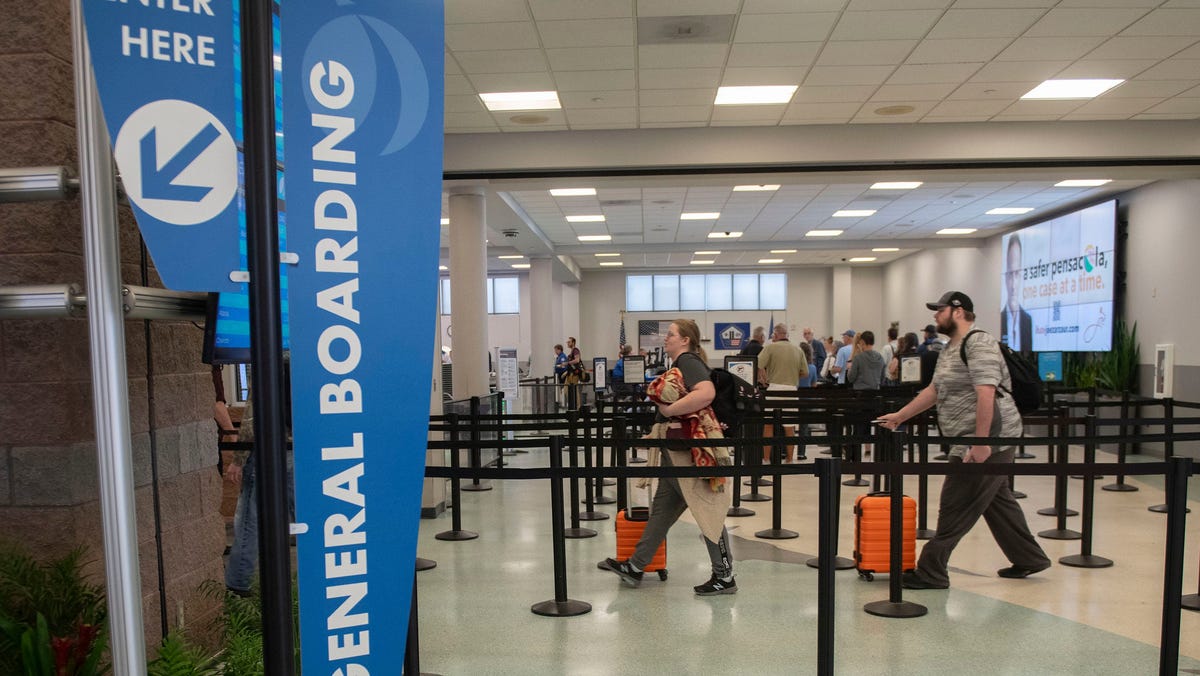Here’s what experts say Iran’s next move could be
The world is waiting to see how far Iran’s response will go after the U.S. hit Iran nuclear facilities with airstrikes.
- Travel to the Middle East and Gulf region, particularly countries with major U.S. military bases, is advised against.
- Travelers should stay updated on travel advisories, news from credible sources, and maintain contact with family and colleagues.
- Travel insurance may not cover cancellations or interruptions due to the conflict, but may reimburse for disruptions in surrounding countries.
The U.S. bombed three Iranian nuclear sites over the weekend, prompting retaliation on Monday and increased security in cities across the U.S.
American travelers who are currently abroad may now be wondering what the escalating tensions amid Israel’s war with Iran mean for their travel plans – with some sharing their trepidation about being overseas or reluctance to return on social media.
But those developments don’t necessarily mean they need to rush home. “For now, with the exception of countries in the Middle East and Gulf region, it’s safe for Americans to travel abroad,” Henry Harteveldt, a travel industry analyst and president of Atmosphere Research Group, told USA TODAY in an email.
Here’s what travelers abroad should know.
Is it safe for US travelers to go abroad?
The State Department issued a Worldwide Caution alert on June 22, advising U.S. citizens across the globe to “exercise increased caution.”
“The conflict between Israel and Iran has resulted in disruptions to travel and periodic closure of airspace across the Middle East,” the alert said. “There is the potential for demonstrations against U.S. citizens and interests abroad.”
Harteveldt said it’s ”probably wise for now to avoid going to any Middle East and Gulf country that has a major U.S. military base.” Travelers should also be extra cautious in other countries that Iran might perceive as being supportive of Israel or the U.S.
“Currently, countries in the Middle East, such as Israel and Jordan, as well as the UAE and Qatar, appear to be the riskiest places for Americans to visit,” he added.
Should US travelers come home after the bombing in Iran?
Not necessarily, but it doesn’t hurt to be prepared. According to Harteveldt, the circumstances are “highly fluid.”
“The situation is dynamic, and the countries that are considered risky could change,” he said.
The State Department is offering assisted departure flights from Israel. U.S. citizens and lawful permanent residents can find crisis intake forms on its website, along with additional information about departures by land through Jordan and Egypt.
“Iran airspace remains closed due to hostilities with Israel,” the State Department said. “U.S. citizens seeking to depart Iran should depart by land to Azerbaijan, Armenia, or Türkiye if they deem conditions are safe/if they can do so safely.”
Qatar also closed its airspace on Monday, and airlines are rerouting or canceling flights to the Middle East.
How can US travelers stay safe abroad?
The State Department’s Worldwide Caution note urged travelers to read up on their planned destinations – including any advisories and security alerts – on its website. There is a Level 4 “Do not travel” advisory in place for Iran, while other Middle East countries like the United Arab Emirates and Qatar are currently at Level 2 (“Exercise increased caution”) and Level 1 (“Exercise normal precautions”), respectively.
In addition to regularly checking those notices for updates, Harteveldt recommended keeping up with the news from credible sources and downloading their mobile apps. “Follow all official advisories and be prepared to respond to news alerts and other advisories,” he said. “Stay in touch with family, friends, and colleagues in the U.S.,” he said.
Travelers should also have “at least one reliable contact” who knows where they are and can act on their behalf as needed.
The CIA released these tips – or travel tradecraft, in spy parlance – for travel safety.
Objective one: Getting there
- CIA tip: Make a paper and digital copy of your passport. While traveling abroad, it might literally be your ticket home if problems arise. If a hotel desk clerk asks to hold on to your passport, see if they’ll accept the paper copy. While you’re at it, write down some important phone numbers on the hard copy, including emergency contacts and the local U.S. embassy, just in case.
- CIA tip: Register with your embassy. Think of it as establishing communications with your home base. This enables embassy staff to contact you if there’s an emergency or an unfolding crisis. U.S. citizens can also sign up with the State Department’s Smart Traveler Enrollment Program (STEP).
- CIA tip: Learn some local lingo. Bring a pocket guidebook or phone app so you can pick up key words and phrases.
- CIA tip: Know your destination. Bone up not just on travel books but also try to get a sense of the place and the geopolitical issues at play there. The CIA World Factbook is very helpful and publicly available for basic information. The CIA’s World Factbook team also has created special travel briefings for many countries.
- CIA tip: Scout out local transportation. Upon arrival, ask an airport official or a traveler’s aide how much it should cost to catch a public shuttle or taxi to your hotel. Check online sites, too. Be sure to negotiate the taxi price before loading your baggage and getting inside. Only use cabs from the official queue – or ride-shares ride-hailing services from official apps – that are clearly marked and have a functioning meter and the driver’s ID displayed inside.
Objective two: Settling in
- CIA tip: Know your escape route from your hotel room too. Familiarize yourself with emergency evacuation plans. And do a run-through to determine how many doors there are between your room and the nearest stairwell. Could you find it in the dark? While holding your breath in a smoky haze?
- CIA tip: Use the elevator, unless it’s an emergency. Using the stairs may be great for exercise, but crimes frequently occur in isolated stairwells.
- CIA tip: Try to reserve a room on a middle floor. Being on the ground floor can leave you vulnerable to break-ins, but many countries’ emergency response personnel aren’t equipped to reach higher than a few floors off the ground.
- CIA tip: Lock it up. Automatic locks on hotel room doors can often be forced open, and the chains cut. Use the deadbolt if there is one. Better yet, invest in a cheap and easily portable rubber door stop; they work amazingly well.
- CIA tip: Beware of unsolicited knocks. Don’t open your hotel door unless you know or can verify who’s on the other side. Be especially wary of unrequested special delivery, maintenance calls, turndown service, or room service. Don’t be shy about calling the front desk to confirm.
Objective three: Going out and about
- CIA tip: Lock it down. Whether renting a car or taking a taxi, lock the doors and keep the windows rolled up if you sense any danger – or crowds. Carjackers and snatch-and-grab thieves often prey on simple mistakes like an open door or window.
- CIA tip: Stay alert. CIA officers (the real term for overseas spies, not agents) are trained to be highly attuned to their surroundings, to constantly maintain situational awareness. Use all five senses to pay attention to what’s happening around you, and you’ll not only spot telltale signs if something is amiss but retain more of your destination’s unique atmosphere.
- CIA tip: Be mindful when drinking adult beverages. Spies might swill martinis in the movies, but alcohol impairs alertness and judgment and could put you at risk, especially in an unfamiliar country. Learn the local customs and restrictions on alcohol consumption and follow them closely.
- CIA tip: Walk the walk. Your confident demeanor on the street is often the best deterrent against criminals. Be the gray man or woman and you won’t look like an easy target. Don’t attract attention by looking confused, lost, or distracted. Avoid poring over maps and phone apps in busy areas. And don’t be flashy. Flaunting extravagant watches and other personal items or cash will attract thieves and opportunists.
- CIA tip: Plan your route and reroute as necessary. Whether traveling by foot, car, or public or private transit, prepare in advance. Bone up on the potentially dangerous parts of town so you can avoid them. Don’t walk alone at night, stick to well-lit areas that aren’t too isolated if you can and know the number of the local authorities just in case. Avoid crowd commotion, as it could mean escalating danger or even a distraction designed to help someone target you.
Does travel insurance cover the conflict with Iran?
“Unfortunately, there may be no coverage for travelers within Iran due to economic sanctions,” said Meghan Walch, Director of Product at InsureMyTrip. “Also, the conflict in general is most (likely not) covered if you decide to cancel or interrupt your trip.”
That said, travelers in surrounding countries who experience disruptions – such as a flight delay meeting the policy’s required number of hours – may get reimbursed for additional costs incurred.
Those policyholders can also call 24-hour emergency assistance services, which can help them find medical care or direct them to a nearby embassy. The phone numbers can be found in their policy, according to Walch.
If you didn’t purchase travel insurance prior to your trip and are already traveling in a destination that the conflict could impact, Walch said it’s too late to buy comprehensive coverage. Those who have not left and are concerned they may want to cancel if the situation escalates should consider Cancel For Any Reason benefits.
“This is a time-sensitive benefit and there are qualification requirements, but it allows you to cancel a trip, at least 48 hours before departure, and receive up to 50%-75% reimbursement of your prepaid, non-refundable trip costs,” said Walch.
Regardless, Harteveldt emphasized the need to stay informed and flexible. “Being nimble and agile will be critical,” he said.
Nathan Diller is a consumer travel reporter for USA TODAY based in Nashville. You can reach him at ndiller@usatoday.com.









Smart bankroll management is key, especially with so many tempting options! Seeing platforms like JL Boss integrate modern tech is cool – makes access easier. Considering the jl boss app download for convenient play – responsible gaming first, though! 😉